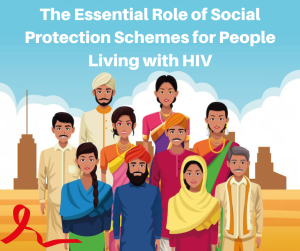The Essential Role of Social Protection Schemes for People Living with HIV

Social protection schemes are essential for people with HIV, as they face various economic, social, and health-related challenges. These schemes can help ensure that people living with HIV have access to the necessary resources and support to maintain their health, improve their quality of life, and participate fully in society. Here are some of the key reasons why social protection schemes are essential for people living with HIV:
Access to healthcare: People living with HIV require regular access to healthcare services, including antiretroviral therapy (ART) and other treatments. Social protection schemes can help ensure that people with HIV have access to the healthcare services they need, even if they cannot afford them.
Reduced poverty: Poverty can exacerbate the challenges faced by people living with HIV. Social protection schemes, such as universal healthcare and concessional travel support, can help reduce poverty and improve the economic situation of people living with HIV, enabling them to manage their health better and participate in society.
Improved food security: Proper nutrition is critical for people living with HIV, as it can help boost their immune system and improve their overall health. Social protection schemes ensure the provision of food assistance to people living with HIV who are struggling to access adequate nutrition.
Access to education and employment: Education and employment opportunities can help people living with HIV overcome social stigma and discrimination and improve their economic situation. Social protection schemes help provide education and employment opportunities to people living with HIV, enabling them to participate fully in society and live more fulfilling lives.
Psychological and emotional support: Living with HIV can be a challenging and isolating experience, particularly for those who are also dealing with poverty, stigma, and discrimination. Social protection schemes can provide psychological and emotional support to people living with HIV, helping them to cope with the emotional and mental health challenges associated with the condition.
Social welfare schemes have the potential to promote inclusion, mainstreaming, and increase retention in care and treatment services for people living with HIV in India, aiming to leave no one behind. In India, social welfare schemes are extended to people living with HIV and their families to prevent poverty and inequality and promote social and economic inclusion. According to the HIV/AIDS Act 2017, Chapter VII, the Central and State Governments are expected to take measures to facilitate access to social welfare/protection/security schemes to address the needs of people living with HIV (PLHIV). Alliance India is working with a community based organisation and providing technical support and community system strengthening for sustainable development. Alliance India’s Vihaan care and support Programme is implemented by 319 SSR and 5 SR partners and links people living with HIV with social protection and social entitlement schemes.
In Rajasthan, various schemes are extended to persons living with HIV and their families, making a significant difference in their lives. Some of the schemes are given below, which our community members can benefit from:
• Palanhar Yojana – To extend the schemes for PLHIV, the new rule 3 (5 C) was added by the Government of Rajasthan, and all the children (Parents living with HIV) are considered eligible for this scheme. The monetary aid provided under this scheme of INR 500 every month until age 5. After school admission, the offered grant raises to INR 1,000 every month until the child attains the age of 18. Additionally, INR 2,000 per year will be provided for clothes and shoes.
• Widow Pension – A monetary support of INR 1,500 per month for beneficiaries under this scheme which applied from 2018. Assam extends this support to a one-time payment of 1.5 lakhs to widows living with HIV.
• National Food Security Antyodaya Anna Yojana under Targeted Public Distribution System – The State of Rajasthan extended the support of including persons living with HIV in the BPL category and further inclusion in AAY. As support, this scheme is extended to 35 kilograms of wheat every month at INR 2 per kilogram to the beneficiary.
• Free blood in all Private and Government Blood Banks – The Government of Rajasthan provisioned the free and without donation availability of blood in need for persons living with HIV in the state. Persons living with HIV can get blood free of cost from private or government blood banks across the state.
• Ayushman Bharat (Universal Health Care) – Free treatment support in private and government health facilities up to INR 500,000 per family. This support is also extended to persons living with HIV.
• Free diagnostics and medicines – In this scheme, all blood, urine, or diagnostic/investigations and medicines in Government health facilities are accessible for persons living with HIV across the state.
• Travel Concession – All persons living with HIV on treatment and travelling to collect ART medicine from the ART centre will get a 75% travel concession once a month.
These are some key schemes, but many more are available that can be extended and availed of. Widespread social welfare is an effective development and retention in care tool that can alleviate poverty and inequality, reduce stigma and discrimination and increase retention in care and treatment. These welfare schemes should come under universal coverage guaranteed by law. Availability, accessibility, and adequacy are prerequisites to leaving no one behind and bringing them into mainstream society with increased retention in care and treatment. A social welfare safety net should be multi-layered, addressing broader social and economic vulnerabilities and not just providing free ART drugs.
Written by Sukhender Kumar, Alliance India
- Made by Nicdark - Copyright 2020
- donations@ong.com
- volunteers@ong.com
- contact@ong.com
India HIV/AIDS Alliance (Alliance India)
A not-for-profit Section 8 Company with Registration No: U85310DL1999NPL098570
Contact
-
6, Community Centre
Zamrudpur Kailash Colony Extension
New Delhi – 110048 - +91-11-4536-7700
Download
©2021 All Rights Reserved by Alliance India



